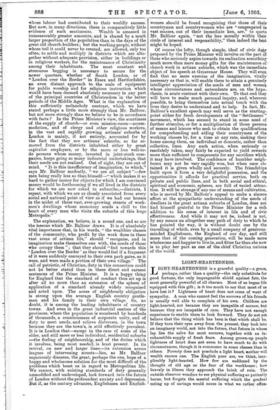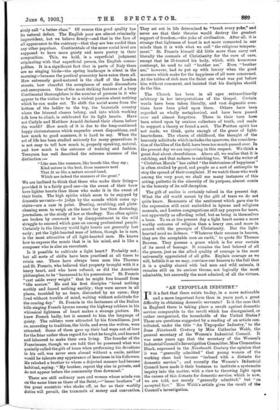LIGHT-HEARTEDNESS.
LIGHT-HEARTEDNESS is a graceful quality—a grace, perhaps, rather than a quality—the only substitute for good fortune, the only impregnable shield against fate, the most generally powerful of all charms. Most of us began life equipped with this gift; is it too much to say that most of us have lost it P Lightness of heart does not come of want of sympathy. A man who cannot feel the sorrows of his friends is usually well able to complain of his own.. Children are light-hearted, not because they are incapable of sorrow, but because they are incapable of care. They have not enough experience to enable them to look forward. They do not yet believe that the thing which has been is that which shall be. If they turn their eyes away from the present, they look into an imaginary world, not into the future, that future in whose lap lies the salve for most sorrows, together with an in- exhaustible supply of fresh fears. Among grown-up people lightness of heart does not seem to have much to do with circumstances, though it is commoner in some classes than'in others. Poverty does not preclude a light heart, neither will wealth ensure one. The English poor are, we think, inex- plicably light-hearted. How few are saddened by the thought of old age or the fear of the workhouse ; how bravely in illness they approach the brink of ruin. The outside observer wonders to see physical suffering so patiently borne, but forgets the mental suffering which the gradual eating up of savings would cause in what we rather offt)n- lively call "abetter class." Of course this good quality has its natural defect. The English poor are almost criminally improvident, but we believe firmly—and that in the face of all appearance to the contrary—that they are less sordid than any other populace. Continentals of the same social level are supposed to have more gaiety and more poetry in their composition. This, we hold, is a superficial judgment originating with that superficial person, the English cosmo- politan. It is a significant fact that in parts of Italy there are no singing birds—the spring landscape is silent in the morning—because the poetical peasantry have eaten them all. How extremely good-natured is the chaff of the London streets, how cheerful the acceptance of small discomforts and annoyances. One of the most Striking features of a busy Continental thoroughfare is the number of persons in it who appear to the visitor to be in a violent passion about nothing which he can make out. To shift the social scene from the bottom of the ladder to the top, the beanstalk country where the leisured classes belong, and into which working folk love to climb, is celebrated for its light hearts. Have not Carlyle and Matthew Arnold declared their charm before the world? How much of it is due to the long-continued happy circumstances which engender sweet dispositions, and bow much to good manners, it is bard to say. When the art of life has been studied seriously for many generations it is not easy to tell how much is, properly speaking, natural, and how much is the outcome of training and fashion. Tennyson has well described the extreme niceness of the distinction :- "Like men like manners, like breeds like, they say ;
Kind nature is the best, those manners next That fit us like a nature second-hand, Which are indeed the manners of the great."
We are inclined to think that those who make their living— provided it is a fairly good one—in the sweat of their brow have lighter hearts than those who make it in the sweat of their brain. The high spirits which seem to be enjoyed by domestic servants—to judge by the sounds which come up- stairs—are a case in point. Dusting, scrubbing, and plate- cleaning seem to weigh on the heart far less than doctoring, journalism, or the study of law or theology. Too often spirits are broken by overwork or by disappointment in the wild struggle to succeed which goes on among professional people. Certainly in the literary world light hearts are generally lost early; yet the light-hearted man of letters, though he is rare, is the most attractive of all light-hearted men. He knows how to express the music that is in his mind, and is like a composer who is also an executant.
Is it possible to cultivate a light heart P Probably not ; but all sorts of shifts have been practised at all times to retain one. There have always been men like Thoreau and St. Francis, who believed that property brought with it a heavy heart, and who have refused, as did the American philosopher, to be " harnessed to his possessions." St. Francis "cast aside every weight" that he might free himself from "idle sorrow." He and his first disciples "loved nothing earthly and feared nothing earthly ; they were secure in all places, troubled by no fears, distracted by no cares ; they lived without trouble of mind, waiting without solicitude for the coming day." St. Francis in the fastnesses of the Italian hills singing French hymns among the highway robbers in his whimsical lightness of heart makes a strange picture. He knew French badly, but it seemed to him the language of gaiety. The robbers were attracted by his friendliness, just as, according to tradition, the birds, and even the wolves, were attracted. Some of them gave up their bad ways out of love for the friar rather than regard for what he taught, and learned and laboured to make their own living. The founder of the Franciscans, though we are told that he possessed what was quaintly called the gift of tears when performing his devotions in his cell, was never seen abroad without a smile, neither would he tolerate any appearance of heaviness in his followers. He rebuked a brother to whom a dejected manner had become habitual, saying: " My brother, repent thy sins in private, and do not appear before the community thus downcast."
There are still ordinary men and women whose minds run °lithe same lines as those of the Saint,—" lesser brothers" of the great eccentric: who shake off, as far as their worldly duties will permit, the trammels of money and convention.
They set out in life determined to "break every yoke," and never see that their theories would destroy the greatest support of freedom,—the yoke of civilisation. After all, it is strange that lightness of heart is not more connected in °dr minds than it is with what we call " the religious tempera- ment." St. Francis himself did little more than carry out literally the counsels of Christianity for the cure of care, except that he ill-treated his body, which, with humorous contempt, he used to call " brother ass." Even " brother. ass," however, had to put up with luxury when the good manners which make for the happiness of all were concerned. At the tables of rich men the Saint ate what was put before him without comment, and insisted that his disciples should do the like.
The Church has been in all ages extraordinarily arbitrary in her interpretations of the Gospel. Certain words have been taken literally, and vast dogmatic erec- tions have been piled upon them. Others have beeu regarded as wholly metaphorical, and have been passed over and almost forgotten. These in their turn have been seized upon by anxious collectors of truth, and made to support a theory or found a, sect. The Puritan spirit has not made, we think, quite enough of the grace of light- heartedness. The charm of childhood, the thought of the heavenly solicitude which includes the sparrows, the considera- tion of the lilies of the field, have been too much passed over. In the present day we are improving in this respect. We think a great deal about cheerfulness. Above all, we realise that it is catching, and that sadness is catching too. What the writer of " Christian Morals " has called " the histrionism of happiness " is often studied by good, sad people as a sort of antiseptic to stop the spread of their complaint. If we watch those who work among the very poor, we shall see many instances of this acting, pathetic in the sincerity of its purpose, almost comio in the honesty of its self-deception.
The gift of smiles is certainly valued in the present day. What the old world meant by the gift of tears we do not quite know. Remnants of the sentiment which gave rise to the expression still exist embedded in hymns and religious manuals, and Lenten congregations still say prayers for tears, not apparently as affording relief, but as being in themselves a boon. To us at the present day a light heart seems a more worthy outcome of religion than a heavy one, and more in accord with the precepts of Christianity. But the light- hearted need no defence. " Whatever their success in heaven, they are the acceptable men on earth," to quote Sir Thomas Browne. They possess a grace which is for ever certain of its meed of homage. It remains the best beloved of all the graces, just as the allied quality of courage is the most universally appreciated of all gifts. Explain courage as we will, belittle it as we may, convince our hearers to the full that it is a quality shared with bad men and wild animals, it remains still on its ancient throne, not logically the most admirable, but assuredly the most admired, of all the virtues.











































 Previous page
Previous page